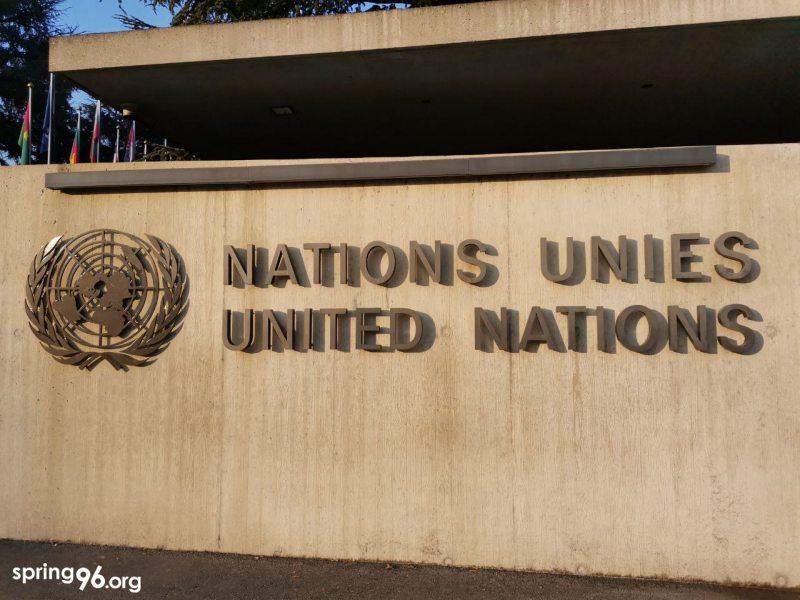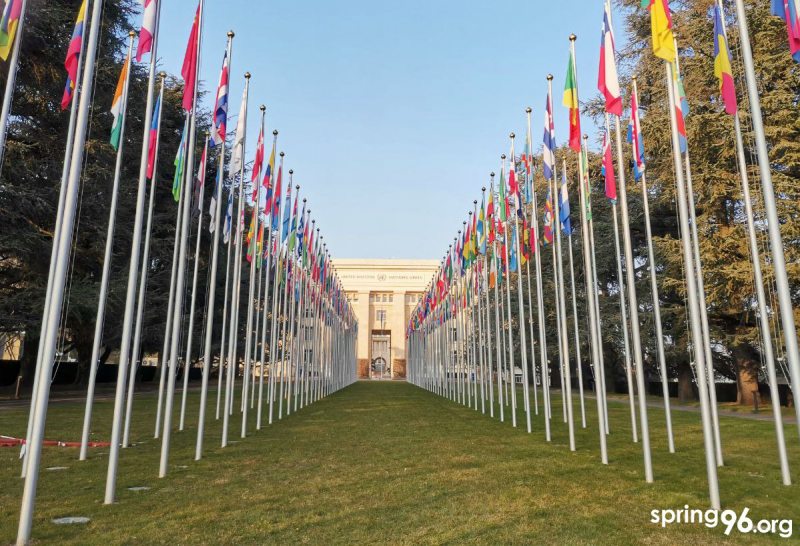Violation of the right not to be tried twice? The UN expressed concern about the use of article 411
Special Rapporteur on the situation of human rights in Belarus and Working Group on Arbitrary Detention appealed to the Belarusian state regarding the application of article 411 of the Criminal Code of Belarus. We publish this appeal.
*There was no response from the Belarusian state to this appeal.
Special Rapporteur on the situation of human rights in Belarus and Working Group on Arbitrary Detention, acting under the mandate of the UN Human Rights Council, received information about the application of article 411 of the Criminal Code of Belarus on malicious disobedience to the requirements of the administration of a correctional institution carrying out a custodial sentence:
-
On 9 June 2021, the Maskoŭski District Court of Brest convicted Palina Sharenda-Panasiuk and sentenced her to 24 months of imprisonment. On 7 April 2022, Čyhunačny District Court of Homieĺ sentenced her to an additional year in prison. On 8 June 2022, Homieĺ Regional Court upheld the verdict. A second trial under article 411 took place on 16 May 2023.
-
On 4 June 2021, the Zavodski District Court of Minsk convicted Viktoryia Kulsha and sentenced her to two years and six months of imprisonment. On 13 June 2022, Viktoryia Kulsha was convicted under article 411 of the Criminal Code by Čyhunačny District Court of Homieĺ and sentenced to an additional 12 months imprisonment. The conviction was upheld by the Homieĺ Regional Court on 10 August 2022. On 7 April 2023, Viktoryia Kulsha was sentenced to 12 additional months of imprisonment under article 411.
"As a result of the application of article 411, criminal liability is derived from a disciplinary offense. The Criminal Code does not contain a list of violations that may entail disciplinary responsibility. Under article 411, prison sentences may be imposed as a result of disciplinary sanctions imposed by officials of the Ministry of Interior in prisons and penal colonies, which may be arbitrary and disproportionate to the gravity of the offense. Further, punishment under article 411 of the Criminal Code is an additional punishment for the same offense(s) for which prisoners have already served disciplinary sanctions. — says the appeal to the authorities of Belarus.
It is reported that the use of article 411 by the courts in Belarus has reportedly expanded significantly since the 2020 presidential elections, with at least 27 persons held on political grounds being sentenced to additional prison terms, compared to two prior to the elections. We would like to express our concern about the use of article 411 of the Criminal Code, which may constitute a violation of the right not to be tried or punished twice for the same offence. We are further concerned that article 411 may be used to prevent the political opposition and activists from operating in an enabling environment and carrying out their legitimate activities without fear of harassment or criminalization of any kind".
In addition, the Special Rapporteur on the situation of human rights in Belarus, Anaïs Marin, and Vice-Chair on communications of the Working Group on Arbitrary Detention, Matthew Gillett, addressed the Belarusian authorities for comments on the following issues:
-
Please provide any additional information and/or comment(s) you may have on the above-mentioned allegations.
-
Please provide information on the legal and factual basis for the trial and convictions of Palina Sharenda-Panasiuk and Viktoryia Kulsha under article 411 of the Criminal Code and explain how is in conformity with your obligations under international human rights law.
-
Please indicate what measures have been taken to ensure that political opposition and activists can operate in an enabling environment and can carry out their legitimate activities without fear of harassment or criminalization of any kind.
"We urge that all necessary interim measures be taken to prevent the re-occurrence of such alleged violation and in the event that the investigations support or suggest the allegations to be correct, to ensure the accountability of any person(s) responsible for the alleged violations," — says the appeal to the authorities of Belarus.
Belarusian authorities are also recommended to study the appendix on references to international human rights law. Here it is:
Reference to international human rights law
In connection with above alleged facts and concerns, we would like to remind your Excellency’s Government to the International Covenant on Civil and Political Rights, ratified by Belarus on 12 Nov 1973.
Article 9 of the International Covenant on Civil and Political Rights provides that no one shall be subjected to arbitrary arrest or detention or deprived of their liberty except on such grounds and in accordance with such procedure as are established by law. As interpreted by the Human Rights Committee in General Comment No. 35 (CCPR/C/GC/35), the notion of “arbitrariness” is not to be equated with “against the law” but must be interpreted more broadly to include elements of inappropriateness, injustice, lack of predictability and due process of law, as well as elements of reasonableness, necessity, and proportionality (paragraph 12). In addition, Article 9 (4) of the Covenant states that anyone who is deprived of his liberty by arrest or detention shall be entitled to take proceedings before a court, in order that that court may decide without delay on the lawfulness of his detention and order his release if the detention is not lawful. The Working Group on Arbitrary detention has established in its jurisprudence that even if the arrest of an individual has been carried out in accordance with the provisions of article 9 of the Covenant, it does not automatically mean that the continued deprivation of liberty also complies with that provision. In other words, it is not only the initial fact of detention that must be in accordance with article 9 of the Covenant, but it is also the duty of the authorities to ensure that the continued detention respects that provision.
Article 14 of the International Covenant on Civil and Political Rights establishes that everyone shall be entitled to a fair and public hearing by a competent, independent and impartial tribunal established by law in the determination of any criminal charge against them. It further states that no one shall be liable to be tried or punished again for an offence of which they have already been finally convicted or acquitted in accordance with the law and penal procedure of each country.
In its general comment no. 32 on article 14: Right to equality before courts and tribunals and to a fair trial, the Human Rights Committee found that “[t]he requirement of competence, independence and impartiality of a tribunal in the sense of article 14, paragraph 1, is an absolute right that is not subject to any exception. The requirement of independence refers, in particular, to the procedure and qualifications for the appointment of judges, and guarantees relating to their security of tenure until a mandatory retirement age or the expiry of their term of office, where such exist, the conditions governing promotion, transfer, suspension and cessation of their functions, and the actual independence of the judiciary from political interference by the executive branch and legislature.” The General Comment further states that “a situation where the functions and competencies of the judiciary and the executive are not clearly distinguishable or where the latter is able to control or direct the former is incompatible with the notion of an independent tribunal.”
Regarding a fair and public hearing, general comment no. 32 states that “all trials in criminal matters or related to a suit at law must in principle be conducted orally and publicly. The publicity of hearings ensures the transparency of proceedings and thus provides an important safeguard for the interest of the individual and of society at large.” While article 14 of the International Covenant on Civil and Political Rights provides that “the press and the public may be excluded from all or part of a trial for reasons of morals, public order (ordre public) or national security in a democratic society, or when the interest of the private lives of the parties so requires, or to the extent strictly necessary in the opinion of the court in special circumstances where publicity would prejudice the interests of justice”, these should be exceptional circumstances.



















